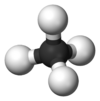Chemistry:1-Decyne
From HandWiki
| Names | |
|---|---|
| Preferred IUPAC name
Dec-1-yne | |
| Other names
1-Decyne
| |
| Identifiers | |
3D model (JSmol)
|
|
| ChEBI | |
| ChemSpider | |
| EC Number |
|
PubChem CID
|
|
| UNII | |
| |
| |
| Properties | |
| C10H18 | |
| Molar mass | 138.254 g·mol−1 |
| Appearance | Colorless liquid |
| Density | 0.767 g/cm3 |
| Melting point | −44 °C (−47 °F; 229 K) |
| Boiling point | 174 °C (345 °F; 447 K) |
Refractive index (nD)
|
1.426–1.428 |
| Hazards | |
| Safety data sheet | External MSDS |
| GHS pictograms |    
|
| GHS Signal word | Danger |
| H226, H315, H318, H335, H410 | |
| P210, P233, P240, P241, P242, P243, P261, P264, P271, P273, P280, P302+352, P303+361+353, P304+340, P305+351+338, P310, P312, P321, P332+313, P362, P370+378, P391, P403+233, P403+235, P405 | |
| Flash point | 48 °C (118 °F; 321 K) |
| Related compounds | |
Related Alkynes
|
Octyne Nonyne Undecyne Dodecyne |
Related compounds
|
Decane Decanol Decene |
Except where otherwise noted, data are given for materials in their standard state (at 25 °C [77 °F], 100 kPa). | |
| Infobox references | |
Tracking categories (test):
1-Decyne is the organic compound with the formula C8H17C≡CH. It is a terminal alkyne. A colorless liquid, 1-decyne is used as a model substrate when evaluating methodology in organic synthesis. It participates in a number of classical reactions including Suzuki-Miyaura couplings, Sonogashira couplings,[1] Huisgen cycloadditions,[2] and borylations.[3]
Under the catalysis of platinum, it reacts with hydrogen to produce decane.[4]
See also
References
- ↑ Anderson, Kevin W.; Buchwald, Stephen L. (2005). "General Catalysts for the Suzuki-Miyaura and Sonogashira Coupling Reactions of Aryl Chlorides and for the Coupling of Challenging Substrate Combinations in Water". Angewandte Chemie International Edition 44 (38): 6173–6177. doi:10.1002/anie.200502017. PMID 16097019.
- ↑ Rostovtsev, Vsevolod V.; Green, Luke G.; Fokin, Valery V.; Sharpless, K. Barry (2002). "A Stepwise Huisgen Cycloaddition Process: Copper(I)-Catalyzed Regioselective "Ligation" of Azides and Terminal Alkynes". Angewandte Chemie International Edition 41 (14): 2596–2599. doi:10.1002/1521-3773(20020715)41:14<2596::AID-ANIE2596>3.0.CO;2-4. PMID 12203546.
- ↑ Ishiyama, Tatsuo; Matsuda, Nobuo; Miyaura, Norio; Suzuki, Akira (1993). "Platinum(0)-Catalyzed Diboration of Alkynes". Journal of the American Chemical Society 115 (23): 11018–11019. doi:10.1021/ja00076a081.
- ↑ Zhiqiang Guo; Lei Hu; Hsiao-hua Yu; Xueqin Cao; Hongwei Gu (2012). "Controlled hydrogenation of aromatic compounds by platinum nanowire catalysts" (in en). RSC Advances 2 (8): 3477. doi:10.1039/c2ra01097f. ISSN 2046-2069. Bibcode: 2012RSCAd...2.3477G. http://xlink.rsc.org/?DOI=c2ra01097f. Retrieved 2021-11-16.
 |







